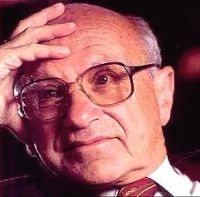Speaking of Friedman
 I mentioned Friedman below. I suppose I should say just a little bit more about the man who passed away recently.
I mentioned Friedman below. I suppose I should say just a little bit more about the man who passed away recently.Friedman was a personal hero of mine. I once had the opportunity to chat with him for about an hour over the telephone. Here's the article that came of it (the Queen's Journal website seems to be down just now... I may update the link if they fix the website). He was lucid, erudite, and quick-witted. I was surprised. I was half-expecting something very different. Maybe I thought, given his age, that he might be a bit difficult to speak with. But he wasn't. Not at all.
I wish I had met him in person. I never did. I would have told him all sorts of things. Milton Friedman was a rare mind.
I did get to chat with him, though, and this was more than enough. I even mailed him two copies of my interview, and he mailed one copy back with his signature across it. I made a poster out of it. It hangs at my parents' cottage.
Maybe one day Canada (or the U.S.) will decide to take Friedman's policy proposals more seriously. There is no doubt that his influence continues to animate many in both countries. Like me. Like many of my friends. Like you, probably. Even if you disagree with Friedman, you can't help but take him seriously. It isn't like you can just ignore him.
The last two weekends I raised a glass to Friedman. I'll keep raising a glass to him. You should too.





7 Comments:
I didn't fully appreciate Friedman as an undergrad, but his work has certainly stood the test of time. Unfortunately, there are those who cannot make the distinction between his ideas and what people do with them.
Steve none of his economic theories have stood the test of time only his ideological propositions have. So sure he is a solid classical liberal philosopher but I fear history is not going to judge his contribution to economics very kindly. But that is a prediction so we wil check back in thirty years from now.
Steve none of his economic theories have stood the test of time only his ideological propositions have.
I suppose that's why those schmoes at the Swedish central bank awarded him the "Nobel" Prize in Economics for his permanent income hypothesis. And of course, inflation has nothing to do with money supply.
steve: I'm surprised by what you linked to. People often make some sort of personal link between what people believe and what sort of person they are. This is a good link to believe in; many times we judge people based on what they believe, rather than what they do. And that's all right. At least sometimes.
But in the case of people like Friedman (and Marx, for that matter), it is not fair to hate him for believing what he did. And that is just what that guy you linked to happens to do. Hate Friedman.
That's ignorant and atrocious. You can disagree with him. Think, like goodwin does, that his theories won't stand up to criticism. That he was wrong, that his reasoning was flawed, that his opinions are poorly formed and so on. That's all fine and dandy. But hate him? That's extreme...
Look the permanent income hypothesis is trivialy true at some high level of abstration (as an aggregation of all individual incomes). But once you start breaking down income levels within the distribution of income and you move into less secure segments it becomes less true. Take a look at what has happened over the last twenty five years. Middle income earners have savaged their savings in order to maintain their standard of living this process was aided an abetted by the provision of private credit on a massive scale. Among these people the mechanics point not to a permanent incomes type explanation but rather towards a generational standard of living expecation hypothesis. Such is more in keeping classical economists like smith and Marx than it is with Friedman's bastardized neoclassical hypotheses which was charmingly designed to counter tecnocratic confidence in managing the economy while at the same time sought to preser4ve the neoclassical insistence that the price system was rersponsive to parametric shifts . In the end I know why central bankers liked the docterine. It changed their operational horizon to the medium to long run and de-politized the short run. It is hard to argue however after the 'greenspan put' that Fed has been all that taken with friedman or that fine tuning (delaying the inevitable correction)does not work. And this points to the problem of Friedman . If Keynes was the economics of the depression Friedman was the economics of the post war boom. Neither of those contexts are relevant today. Friedman's docterines were time bound observations some of which were even bogus at that time.
And yet...
- all income groups have more today than they did 50 years ago.
- people who were poor a couple decades ago are more than likely not poor today.
- life expectancy continues to rise among all income levels.
- societies which based their economies on Marx et al have either collapsed, tweaked their systems to allow a large degree of free market economics, or struggled through continued poverty.
Nice thoughts. I checked in here a couple of times after his death because I figured you'd have some interesting thoughts after I recalled your interview in the Journal. That was such a coup at the time! Hope you are well. -AD
Post a Comment
<< Home